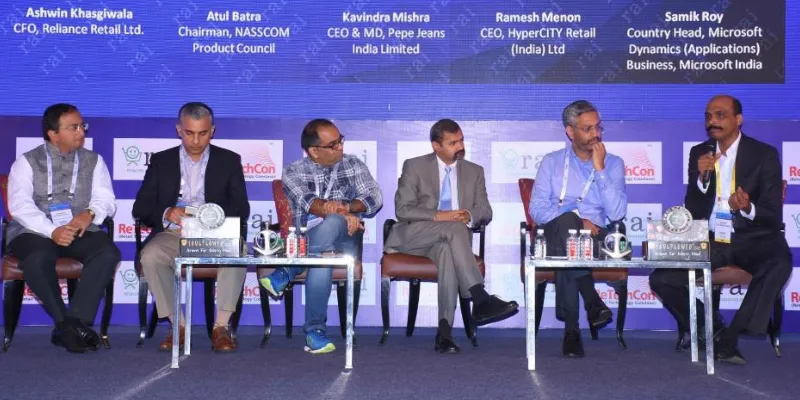Retail can be 50pc of GDP through tech adoption, govt support: Kumar Rajagopalan of RAI
In the next three years, retailers will be able to intuitively refill one’s kitchen supplies when they’re close to running out, believes Retailers Association of India (RAI) CEO Kumar Rajagopalan. According to him, big data and IoT will revolutionise retail, given the creation of a conducive ecosystem for retailers gearing up for the third industrial revolution to adopt tech innovations.

“We live in a digital world. Retailers have to innovate consistently to win in the marketplace. Today, customer-centricity cannot be obtained without innovation, collaboration, and continuous transformation,” Kumar said at the 11th edition of the Retail Technology Conclave (ReTechCon) in Mumbai on June 14-15.
The RAI’s flagship event included talks by CROs and CIOs of retail giants, a lineup that included Abhilasha Joshi, Business Head, Juice Salons; Bhupesh Dinger, Director–Operations, Enrich Salons & Academy; Gulshan Bakhtiani, Director, Wellness Forever; and Rajiv Nair, CEO, Kaya.
Striking while the iron is hot
Kumar feels GST will speed up the tech-adoption timeline because the fastest way for traditional retailers to make their operations GST-compliant is through basic tech enablement. While only 10-15 percent retailers qualify as modern at the moment, he predicts that figure will rise to 40-50 percent by 2020.
In Kumar's opinion, once retailers cross the digital threshold, it will not be difficult to take them all the way, and wants to ensure that the RAI plays a central role in that transition.
“We embarked on a mission 12 years ago to modernise retail in a predominantly traditional country. It’s a pro-government mission, because if we don’t formalise retail, we will always be a country that will engage in wheeling-and-dealing kind of concepts, with the government knowing nothing about it. The government and we finally want the same things,” he explains.
Over the last few years, in close consultation with the RAI, as many as three policies were created for the retail sector, with Maharashtra, Karnataka, and Andhra Pradesh leading the charge and 11 other states following suit.
“GST is a game changer, but the government underestimates the importance of retail. Rules for retail have been created—for example, the regulations surrounding FDI—without truly understanding it. If you have created a policy for an industry without even defining it fully, it shows scant respect for an industry that employs 43 million people. Fifty percent of GDP can be retail, but it can’t happen without the government doing its bit and understanding its capabilities and patting our shoulders,” explains Kumar.
In that regard, there was also a closed-door event for the retailers among the delegates, in order to discuss compliance, transition, and impact of GST, besides other panel discussions on key areas like increasing customer delight through digital, supply chain transformation, adopting the “phygital” way, innovations in digital payments, capturing micro-moments in digital marketing, harnessing the potential of hyperlocal technologies, and Future of Point of Sale (POS) systems.
In fact, RAI also started a “GST helpline” two weeks ago as GST slabs were defined by the government, giving rise to some obvious disarray as industries scurry to become compliant. With an email mechanism as well as a helpline and WhatsApp route instated to include all sorts of retailers, the team has received 50-odd queries already, some rudimentary and some complex.
For example, according to the tax laws, the delivery charges would fall under the same slab as the product with the highest GST applied to it, in case of multiple products being delivered at the same time. Thus, the contention is that delivery charges should be a separate category under services.
Another instance of a query is whether invoices for taxable and exempt items need to be drawn up separately, or why there is a differentiation between a branded and non-branded commodity—where food security is urging people to own up to what they’re doing and branding their ware, taxing it extra sends out mixed signals.
“We have instated a panel of experts—CAs from ICAI, legal experts—to answer these questions. We are also working on creating a resource based on the most common queries we receive,” Kumar let on.
All eyes on retail
The pressure is on RAI to ensure people who want to take the technological leap can do so in a seamless manner—right from helping with connections from their network, to intensive guidance on how to enable it. Their agenda targeted pain points like payment systems, which have been completely revolutionised over the past few years.
Traditionally, the cost of accepting digital payments for the merchants has been more than accepting cash payments, which is what tilts the debate in favour of cash, in spite of the demonetisation exercise and the whole lobby for digital. For example, the biggest cost for merchants was the merchant discount rates (MDR). Every time someone accepted payments by debit or credit card, they would have to pay a one-three percent commission to the accepting bank, which was also the profit margin a typical retailer would have.
“With BHIM Aadhaar, the government will now in fact give them 0.25 percent instead of charging them, which is huge for retailers. We want to push for that,” said Kumar.
The talks also touched upon multi-channel retail, how to get people to browse online and buy offline, buying online and getting delivery at a different point, how to create click-and-collect models. “At the conclave itself, we saw companies building new types of POS machines, innovative displays, transformative technologies such as VR, biometric payment systems, live 3D-printing, the world’s first CCTV auditing software, apps that reinvent shopping, and intelligent business systems,” he said.
ReTechCon 2017 also hosted the second edition of the ReTech Startup Awards, and three winners were declared after 10 shortlisted startups presented 10-minute elevated pitches. Some of them were InteliTaap Solutions (India), (provides actionable in-store analytics for retailers), GeoMarketeer (supports Indian industries with geo-location-based intelligence), and Planetworx Technologies (an IoT startup bringing online elements to a customer’s offline experience).







